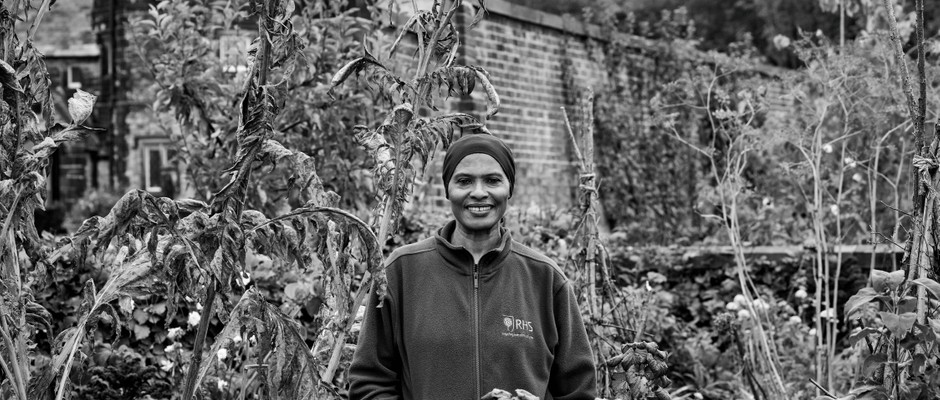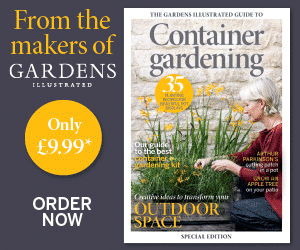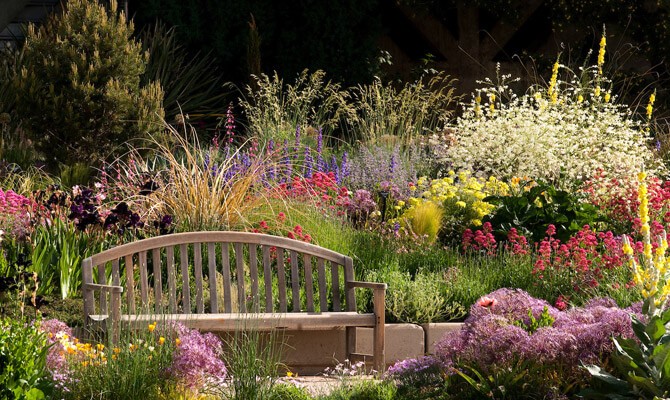
Ozichi Brewster on developing a love of nature and putting people first
The gardener helping people to better health on developing a love of nature at her grandmother’s knee, the pleasure of finding a purpose in life and the importance of putting people first. Portrait Jason Ingram
Ozichi Brewster is the Royal Horticultural Society’s first therapeutic gardener, a role that sees her running the Community Well Being Garden at RHS Garden Bridgewater in Manchester. “It’s amazing what a garden can do,” she says. “Once people are truly working together, weeding, clearing, tending, then everyone becomes a team and people unite. Horticulture does this so readily and easily, bringing people together.”
It’s a job she seems made for but she very nearly didn’t apply. “I thought I’d stick out like a sore thumb at the RHS,” she says. Luckily for the RHS, her daughter made her see sense. “She said: ‘It’s a gardening job, it’s made for you.’”And she was right, although Ozichi’s route to this ideal job has been far from straightforward.
Horticulture does this so readily and easily, bringing people together.
She has always loved nature. As a small child she lived with her grandparents in Nigeria. “My parents were having to juggle work, education and childcare in the UK, so they sent us back to live with our grandparents,” she says. “It was the best thing that ever happened to me. My love for the earth and respect for nature comes from living a village life; all my food was dependent on what was around me. My grandmother taught us to forage, grow and produce the food that we needed. We didn’t call it gardening; it was part of living within nature.”
Aged nine, she returned to live with her parents in Streatham. “I was shocked by the different way of living,” she says. But her parents did have a garden. “It was a typical Victorian terrace that had been a bit of a junk yard, but my mum and I cleared it and started to grow veg,” she says. “It was not so much part of the natural landscape as it had been in Nigeria, but it was better than nothing.”
We didn’t call it gardening; it was part of living within nature.
When she left school she took on a range of jobs with supporting people at their heart. One of these was working for the Paddington Farm Trust in Glastonbury, an innovative farm created to introduce Londoners to country life. “It was a 42-acre mixed farm and I was residential centre manager. I organised the programmes for the residents, everything from hedge laying to lambing. I really thought I’d found my place in the countryside with that job.”
Ultimately, the need to balance work with childcare made this ideal job unviable and took her first to Bristol, working as National Helpline co-ordinator for Women’s Aid, and eventually back to London where she worked for a firm of solicitors specialising in mental health work. “At the time there was not good representation for people detained in hospital because of their mental health and I became very interested in how people fall through the loopholes,” she says. She became an advocate both as a legal representative for patients and as a panel member of the tribunals overseeing patients. “It was a very good job, but a very draining one,” she says. One day she found she physically couldn’t get out of bed. “My body caved in. I was burnt out.”
More like this
So, in 2005, realising something had to change, she returned to her first love, gardening. “I got an allotment, I started growing again,” she says. “I went back to tribunal work, but I’d turn up breathless because I’d come straight from my vegetables.”
I didn’t have to get back to the countryside to be with nature, I could find it in Croydon.
Eventually, in 2010, she handed in her notice and looked for a way that she could combine the work that she loved: people and plants. She took some courses with the Centre for Alternative Technology and the Brighton Permaculture Trust, and she saw a way forward, one that embraced community and a better way to live. “I started to relax. The courses gave me permission to do things differently,” she says. “I didn’t have to get back to the countryside to be with nature, I could find it in Croydon.”
She started to teach gardening and healthy eating and set up a garden at a local school for children with severe special needs. “If you’re truly people centred and meet people where they are, then you can make a difference,” she says. “You have to work with both the people and the space to make somewhere that anyone can be included and involved, which really calls for observing rather than forcing anything, so that you can find something for everyone.
People are magic, and once they get the opportunity to step forward, they create magic.
“We all need a purpose in life, we need to feel useful. If you can get someone to a place where they can feel part of a team and make a beautiful space, whether that’s planting something or just sweeping up the area, then because that change is quite instant, it’s appreciated. And when someone sees they are appreciated, they feel good.”
Ozichi sees her current role as facilitating and supporting rather than leading. “People are magic,” she says. “And once they get the opportunity to step forward, they create magic. We have volunteers here at the RHS from all walks of life making something truly beautiful.” And it really is. Ozichi has created something unexpected and already very cherished, which makes the RHS very lucky indeed.
USEFUL INFORMATION
RHS Garden Bridgewater, Occupation Road, Salford, Greater Manchester M28 2LJ. Tel 0161 503 6100, rhs.org.uk
Authors
Alys Fowler is a horticulturist, garden writer and Guardian columnist.

Niwaki bundle worth £57 when you subscribe
Subscribe to Gardens Illustrated magazine and claim your Niwaki bundle worth £57
*UK only

Container Gardening Special Edition
The Gardens Illustrated Guide to Container Gardening.
In this special edition, discover colourful flower combinations and seasonal planting schemes for pots designed by leading plantspeople, and essential know-how for container gardening success. Just £9.99 inc UK p&pBy entering your details, you are agreeing to our terms and conditions and privacy policy. You can unsubscribe at any time.

Gardens of the Globe
From botanical wonders in Australia to tranquil havens closer to home in Ireland, let this guide help you to discover some of the most glorious gardens around the world
By entering your details, you are agreeing to our terms and conditions and privacy policy. You can unsubscribe at any time.




